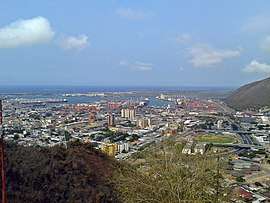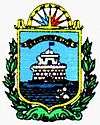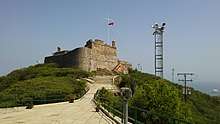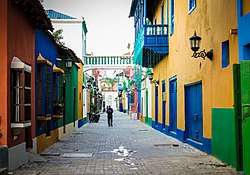Puerto Cabello
Puerto Cabello (Spanish pronunciation: [ˈpweɾto kaˈβeʝo] (![]()
Puerto Cabello | |
|---|---|
 | |
 Flag  Seal | |
.svg.png) Puerto Cabello | |
| Coordinates: 10°28′00″N 68°01′00″W | |
| Country | Venezuela |
| State | Carabobo |
| Counties | Puerto Cabello |
| Demonym | Porteño |
| Government | |
| • Mayor | Economista Rafael Lacava Evangelista (2008 - 2012) |
| Area | |
| • Total | 729 km2 (281 sq mi) |
| Population (2001) | |
| • Total | 201.511 (INE, 2,010) |
| • Density | 276.42/km2 (715.9/sq mi) |
| Climate | Aw |
| Website | Alcaldía de Puerto Cabello |
Climate
| Climate data for Puerto Cabello | |||||||||||||
|---|---|---|---|---|---|---|---|---|---|---|---|---|---|
| Month | Jan | Feb | Mar | Apr | May | Jun | Jul | Aug | Sep | Oct | Nov | Dec | Year |
| Average high °C (°F) | 30 (86) |
29 (85) |
30 (86) |
30 (86) |
31 (87) |
31 (87) |
31 (87) |
31 (88) |
32 (89) |
31 (88) |
30 (86) |
30 (86) |
31 (87) |
| Average low °C (°F) | 22 (72) |
22 (72) |
23 (73) |
23 (74) |
23 (74) |
23 (74) |
24 (75) |
23 (74) |
24 (75) |
25 (77) |
24 (75) |
23 (74) |
23 (74) |
| Average precipitation mm (inches) | 99 (3.9) |
33 (1.3) |
10 (0.4) |
43 (1.7) |
89 (3.5) |
76 (3) |
110 (4.3) |
99 (3.9) |
64 (2.5) |
61 (2.4) |
94 (3.7) |
100 (4.1) |
880 (34.7) |
| Source: Weatherbase[1] | |||||||||||||
History

The foundation date of Puerto Cabello is not known although its name was documented for the first time on the map of the province of Caracas prepared in 1578 by Juan de Pimentel.
Puerto Cabello's location made it an easy prey to buccaneers and was a popular trading post for Dutch smugglers during the 17th century. Most of the contraband trade consisted of cocoa with neighboring island Curaçao, colonized by the Dutch. Puerto Cabello was also at that time under Dutch control.
It was not until 1730 that the Spanish took over the port, after the Real Compañía Guipuzcoana had moved in. This company built warehouses, wharves and an array of forts to protect the harbor.
During the War of Jenkins' Ear, Puerto Cabello was the careening port of the Company, whose ships had rendered great assistance to the Spanish navy in carrying troops, arms, stores and ammunition from Spain to her colonies, and its destruction was a severe blow to both the Company and the Spanish government. The commodore Charles Knowles in command of the 70-gun HMS Suffolk in 1743 received orders to carry out attacks on the Spanish settlements at Puerto Cabello and La Guaira. The Spanish governor Gabriel de Zuluaga, well informed of the plans, recruited extra defenders and acquired gunpowder from the Dutch. Consequently, at an attack on La Guaira, on 18 February 1743, the English fleet was beaten off by the defenders. Knowles withdrew his force and refitted at Curaçao before attempting an assault on Puerto Cabello on April 15, and again on April 24, but both assaults were beaten back. Knowles called off the expedition and returned to Jamaica.
By the 1770s, Puerto Cabello had come to be the most fortified town on the Venezuelan coast. The San Felipe castle and the Solano fortress remain from the period. The frigate Santa Cecilia (former HMS Hermione), under the command of Captain Don Ramón de Chalas, sat in Puerto Cabello until Captain Edward Hamilton, aboard HMS Surprise, cut her out of the harbour on October 25, 1799. The Spanish casualties included 120 dead; the British took 231 Spaniards prisoner, while another 15 jumped or fell overboard. Eleven of Hamilton's men were injured, four seriously, but none was killed. Hamilton himself was severely wounded.
The forces of the First Republic of Venezuela briefly held San Felipe castle. In 1812 Simón Bolívar, then a colonel in the independentist forces, was appointed commandante of Puerto Cabello. He left after a royalist rebellion broke out. In 1821 the Spanish retreated to the castle after their defeat at the decisive Battle of Carabobo.
Puerto Cabello was the last Spanish royalist stronghold during Venezuela's war for independence, it was captured by José Antonio Páez on November 8, 1823. The harbour came under Anglo-German attack in the Venezuelan crisis of 1902–03 and according to press reports was left in ruins.
In 1962, Puerto Cabello was the site of an uprising, known as El Porteñazo, by pro-Fidel Castro naval officers, marines, and members of the FALN. Although loyalist naval forces were able to quickly take back the base and arrest the rebels, they were unable to prevent the marines from occupying the city and arming pro-Castro forces. Despite ambushes and bloody house-to-house fighting, loyal National Guard and mechanized regular forces were able to retake Puerto Cabello.[2]
With the ongoing crisis amid food shortages on 23 February 2019 that coupled with economic damage, the aid that was supposed to arrive at the port was turned away by the Bolivarian Navy of Venezuela, threatening to "open fire" at it, forcing the aid to redirect back to Puerto Rico.[3]
Tourism

.jpg)
Attractions
- Protestants Graveyard.
- Solano Fortress (part of the San Esteban National Park)
- San Felipe Castle.
- Long Island.
- Puente de Los Españoles (San Esteban Pueblo).
- Teatro Municipal
Natives
- Carlos Zambrano, professional baseball player for the Miami Marlins, was born here.
- Pablo Sandoval, professional baseball player for the San Francisco Giants, was born here.
- Fernando Nieve, professional baseball player for the New York Mets, was born here.
- Víctor Moreno, professional baseball player, was born here.
- Félix Doubront, professional baseball player for the Chicago Cubs, was born here.
- Willson Contreras, professional baseball player for the Chicago Cubs, was born here.
- Bartolomé Salom, military hero of independence war.
- José Altuve, professional baseball player for the Houston Astros was born here.
- Italo Pizzolante, poet, writer, composer, singer and engineer
Transport
Puerto Cabello is served by a station on the Instituto de Ferrocarriles del Estado network.
Industry
The UCOCAR shipyards are in Puerto Cabello and have been awarded contracts to construct patrol vessels for the Venezuela Coast Guard.[4][5]
Economy
Despite the Puerto Cabello's once bustling port, port traffic disappeared when the price of oil collapsed, which affected the country that was dependent on imports paid for with the high price of oil.[6] As part of the Venezuelan crisis, many of the poorer citizens in "shantytowns" in Puerto Cabello now struggle for food.[7] Citizens wait in long lines to buy government-mandated priced groceries and the current (bolivers) experienced nearly 64% depreciation as of May, 2017.[8] As of August 2017, the depreciation percentage was as much as 94%.[9]
See also
- Venezuela
- Carabobo State
- List of cities in Venezuela
- Railway stations in Venezuela
References
- "Weatherbase: Historical Weather for Puerto Cabello, Venezuela". Weatherbase. 2011. Retrieved on November 24, 2011.
- "Venezuela: Siege of Puerto Cabello". The New York Times. June 15, 1962. Retrieved 28 December 2009.
- Polanco, Anggy; Armas, Mayela; Bocanegra, Nelson (24 February 2019). "Venezuela's Guaido says "all options open" after Maduro blocks aid". Thomson Reuters Foundation. Retrieved 24 February 2019.
-
Armando F. Mastrapa III (2012-01-11). "Cuba & Venezuela will jointly build coastal patrol boats". Cubapolidata. Archived from the original on 2012-02-02. Retrieved 2012-02-02.
An agreement has been signed between the Venezuelan Defense Ministry and Cuban Transportation Ministry to jointly build patrol boats for the Venezuelan Navy in Puerto Cabello (Carabobo), announced Admiral Diego Alfredo Molero Bellavia (Commander General, Venezuela Navy).
-
"JDW 10-Jan-2012 Venezuela, Cuba sign patrol craft accord". Jane's. 2012-01-10. Archived from the original on 2012-02-02. Retrieved 2012-02-02.
The Venezuelan Ministry of Defence and the Cuban Ministry of Transport on 5 January signed an agreement under which Cuban technicians will assist in production of coastal patrol craft production at Venezuela's UCOCAR Navy shipyard.
- "This picturesque Venezuelan beach town was once prosperous — now the free-spending tourists are gone". Cbc.ca. Retrieved 12 October 2017.
- "This picturesque Venezuelan beach town was once prosperous — now the free-spending tourists are gone". Cbc.ca. Retrieved 12 October 2017.
- "Venezuela Devalues Currency 64% on New FX Auction Platform". Bloomberg.com. 31 May 2017. Retrieved 12 October 2017.
- "Venezuela's currency crumbles at dizzying speed". Enca.com. Retrieved 12 October 2017.
External links
| Wikimedia Commons has media related to Puerto Cabello. |